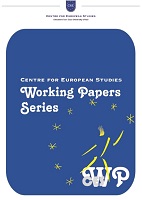The “Eastern Partnership” Project: Does Poland’s Voice still Matter?
The “Eastern Partnership” Project: Does Poland’s Voice still Matter?
Author(s): Ivanna MachitidzeSubject(s): International relations/trade, EU-Accession / EU-DEvelopment
Published by: Editura Universităţii »Alexandru Ioan Cuza« din Iaşi
Keywords: Eastern Partnership; strategy of marginality; EAP:Poland; Carl Bildt;
Summary/Abstract: When in the year 2009 Radoslaw Sikorski and Carl Bildt, architects of the Eastern Partnership project, launched the ambitious scheme of bringing the six post-Soviet countries closer to the EU, they could hardly predict that in nearly five years the tremendous diplomatic, political efforts to design an effective soft power approach would find itself on the verge of failure. In this relation, Poland’s role in bringing the EaP countries under the umbrella of the project long before becoming the EU member, however, most productively since joining the organization, could not be underestimated. Despite a complicated historical legacy with some of the EaP members, namely, Ukraine, Belarus and Moldova, Poland together with the Baltic countries turned out to be a vocal proponent of bring-ing the former ones under the initiative, aiming to empower them with the leverage against Russia’s successful efforts to destabilize the region and preserve domination in its immediate neighborhood. Nevertheless, taking into account the changes in Poland’s political climate, namely, victory of the Law and Justice Party in both presidential and parliamentary elections of 2015 as well as its pessimist stance towards effectiveness of the Eastern Partnership project, the question arises whether Poland’s voice still matters in the future of the EaP and whether it sees itself as the moving force of the project.
Journal: CES Working Papers
- Issue Year: 8/2016
- Issue No: 3
- Page Range: 376-390
- Page Count: 15
- Language: English

